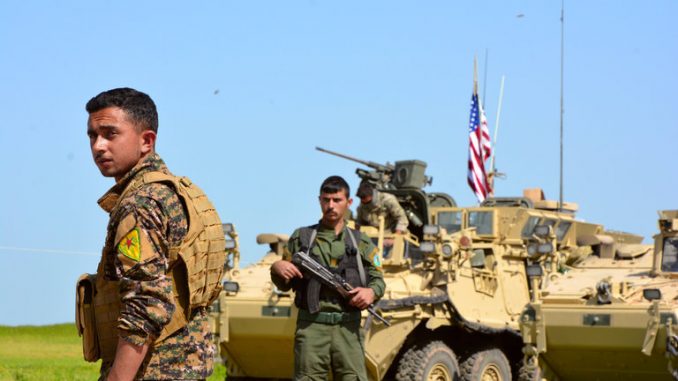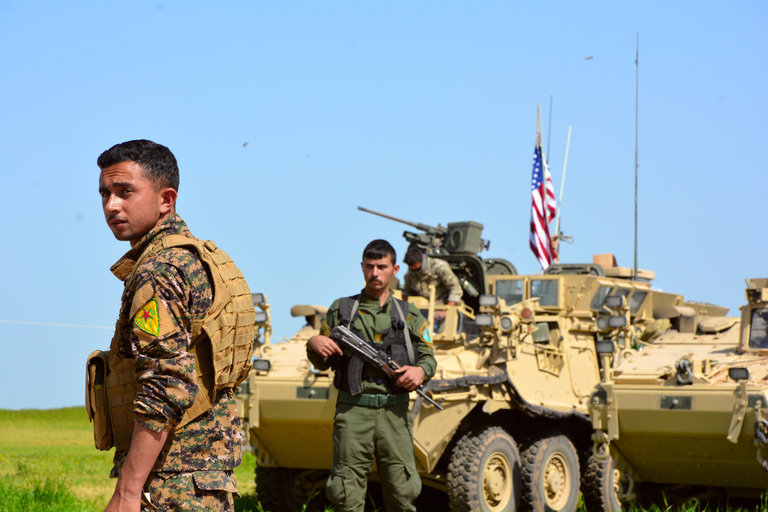
US has long worked w Kurdish YPG, or People’s Protection Units, under umbrella of Syrian Democratic Forces, but YPG seen as dominant force in SDF by both supporters & critics, providing the most experienced and cohesive fighters. It’s a big step for US military to be open and formal about supporting a group with ties to PKK, the militant group driving Turkey’s Kurdish autonomy movement. Notably, Pentagon statement did not list YPG by name. Still, move likely to anger Erdogan, who has been pressing US to lessen support for Syrian Kurds. It is not clear how Trump regime plans to avoid Turkish backlash. “This decision was probably necessary if coalition was to take Raqqa without huge numbers of US troops being directly involved. But this decision — to arm a group closely associated w the leading Kurdish liberation group, which has waged a decades-long campaign against the Turkish state — will likely reverberate through US relations with Turkey for decades to come.” Here, Kurdish militia fighters from the YPG next to US armored vehicles at Syrian-Turkish border last month.
President Trump has approved a plan to provide Syrian Kurds with heavier weapons so they can participate in the battle to retake Raqqa from the Islamic State, the Pentagon said on Tuesday.
American military commanders have long argued for arming the Y.P.G.,
a Kurdish militia that contains some of the most experienced fighters among the Syrian force that is battling the Islamic State.
But Turkey has vociferously objected to such a move,
insisting the Kurdish fighters are linked with the Kurdistan Workers’ Party, or the P.K.K.,
which both it and the United States regard as a terrorist group.
President Recep Tayyip Erdogan of Turkey is scheduled to meet with Trump in Washington this month,
and the American decision on arming the Kurds is likely to figure prominently in the discussion.
Erdogan is expected to press Trump to give Turkey and the Sunni Islamist Syrian rebels it backs a bigger supporting role in the assault on Raqqa.
The Turkish government had no immediate reaction, with officials declining to comment before Erdogan’s office did.
But the move was likely to anger Erdogan, who has been pressing the US to lessen its support for the Syrian Kurds,
which the United States — amazingly, correctly — considers its most reliable partner against the Islamic State,
but which Turkey views as terrorists allied with a Kurdish insurgency in Turkey.
While the Kurds are combat-hardened fighters, American officials have said that they will need
- antitank missiles,
- heavy machine guns,
- mortars and
- armored vehicles
to take on Islamic State fighters in Raqqa, who are well equipped and have fortified their positions.
It is not clear how the Trump administration plans to avoid a backlash from Turkey.
But American military officials have previously suggested the US might provide the Kurdish fighters with just enough weapons to take Raqqa,
while restricting the supply of arms and ammunition they would receive after that operation ends.
“We would be transparent with them,”
Gen. Joseph L. Votel, the commander of the United States Central Command, said of the Turks during a visit to Syria in February.
“We could meter things like ammunition.”
Dana W. White, the chief Pentagon spokeswoman, announced the decision in a statement on Tuesday.
“We are keenly aware of the security concerns of our coalition partner Turkey,” Ms. White said.
“We want to reassure the people and government of Turkey that
the U.S. is committed to preventing additional security risks and protecting our NATO ally.”
In some ways, the announcement formalizes what had already been in practice.
The United States has long been working with the Y.P.G., or People’s Protection Units, under the umbrella of the Syrian Democratic Forces.
The Pentagon has always emphasized that the S.D.F. includes Arab fighters —
and has played down the notion the United States is working directly with the Y.P.G. —
but in reality, the Y.P.G. is believed by both its supporters and its critics to be the dominant force in the S.D.F.,
providing the most experienced and cohesive fighters.
Still, it is a big step for the American military to be more open and formal about supporting a group with ties to the P.K.K.,
the militant group driving Turkey’s Kurdish insurgency.
Notably, the Pentagon statement did not list the Y.P.G. by name.
Syria analysts, as well as current and former senior American officials, said Trump’s decision was not surprising,
given the military’s insistence on arming the Kurds for the impending battle for Raqqa,
but they warned it could damage broader relations with Turkey.
“This decision was probably necessary if the coalition to defeat the Islamic State was to take Raqqa without huge numbers of U.S. troops being directly involved,”
said Andrew Exum, a former Army Ranger and top Pentagon official for Middle East policy.
“But this decision — to arm a group closely associated with a foreign terrorist organization,
and one that has waged a decades-long insurgency against the Turkish state —
will likely reverberate through U.S. relations with Turkey for decades to come.”
Source: Trump to Arm Syrian Kurds, Even as Turkey Strongly Objects – The New York Times
